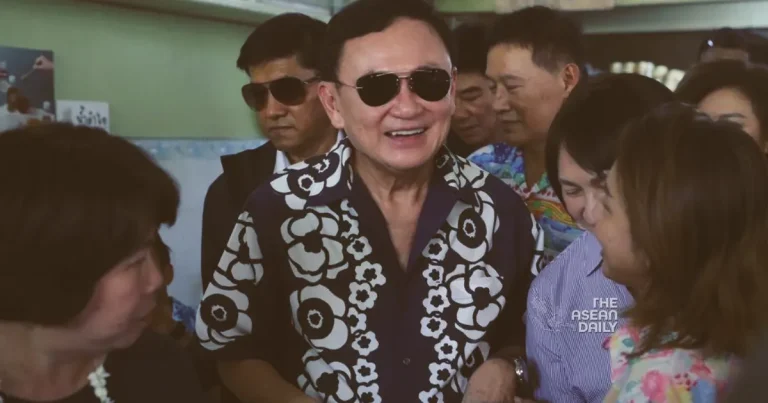9-5-2024 (BANGKOK) Paroled former prime minister Thaksin Shinawatra allegedly engaged in covert diplomacy during his recent trip to Phuket, meeting with Malaysian Prime Minister Anwar Ibrahim to discuss sensitive issues, including the unrest in Thailand’s deep South and the ongoing conflict in Myanmar, according to sources privy to the discussions.
Thaksin, who remains the de facto leader of the ruling Pheu Thai Party despite his legal entanglements, arrived in Phuket on April 29 and departed on May 2, claiming the visit was a private leisure trip. However, questions have been raised regarding the true purpose of his sojourn and whether it violated the conditions of his parole.
Sources with knowledge of the matter suggest that the southern unrest in Thailand was a topic of discussion during Thaksin’s meeting with Anwar Ibrahim. The Malaysian leader has long expressed a keen interest in acting as a mediator in peace talks between Thailand and southern insurgent groups, a role he sought to play even during the tenure of the previous Prayut Chan-o-cha government.
Moreover, the escalating violence in Myanmar was also believed to have been on the agenda, as Anwar has previously urged Thailand to take a more proactive stance in addressing the conflict that has engulfed its neighbor.
Thaksin’s alleged meeting with Anwar comes on the heels of the former prime minister’s earlier encounters with representatives of resistance groups during his trip to Chiang Mai on April 13, further fueling speculation that the situation in Myanmar may have been a subject of discussion between the two leaders.
Foreign Affairs Minister Maris Sangiampongsa previously acknowledged that Thaksin’s talks with rebel groups in Myanmar were conducted on a personal level and did not reflect the Thai government’s official policy toward its neighbor. While Maris did not deny the meetings took place, he maintained that it was an internal matter for the Myanmar government, and the Thai administration was not involved.
Reports from Voice of America (VOA) Myanmar, citing sources close to Thaksin, corroborated the former prime minister’s meetings with representatives of the Kachin National Organisation and the National Unity Government, purportedly in an effort to resolve the armed conflict against the ruling junta. These encounters were reportedly followed by another meeting with the leader of the Shan State Reconstruction Council and the Shan State Army, according to VOA Myanmar.
These informal talks came in the wake of armed ethnic groups seizing control of Myawaddy, a key trading post with Thailand across the border from Mae Sot district in Tak province.
While Maris claimed to have no details regarding Thaksin’s informal talks with these groups, he asserted that it was the Myanmar authorities themselves who had sought the former prime minister’s assistance.
However, according to the Facebook page of Pat Hemasuk, an independent academic, it was Thaksin who dispatched representatives to arrange appointments with these groups for talks that took place during his recent visit to Chiang Mai.
Wanwichit Boonprong, a lecturer at Rangsit University’s faculty of political science, opined that Thaksin’s talks with rebel groups in Myanmar were a calculated move to restore his reputation and boost the popularity of the Pheu Thai Party and its leader, Paetongtarn – Thaksin’s daughter.
Nonetheless, Wanwichit cautioned that Thaksin’s actions could create problems if they are not aligned with the Foreign Affairs Ministry’s approach to the Myanmar crisis.
Echoing this sentiment, Panitan Wattanayagorn, an expert in international relations and security affairs, emphasized that any initiative by Thaksin regarding the Myanmar issue should be in line with the formal framework of ASEAN’s Five-Point Consensus, as agreed upon by the regional bloc’s leaders.
As concerns mount over whether Thaksin may have breached his parole conditions following reports of his talks with rebel groups in Myanmar, Sahakarn Petchnarin, director-general of the Department of Corrections, stated that the Department of Probation would investigate the matter. If the violation is deemed non-severe, Thaksin will likely receive a warning.
Rangsiman Rome, a Move Forward Party MP who chairs a House committee on state security and border affairs, expressed concerns that Thaksin’s actions, undertaken without holding any official government position, could sow confusion regarding Thailand’s role in the Myanmar conflict.




